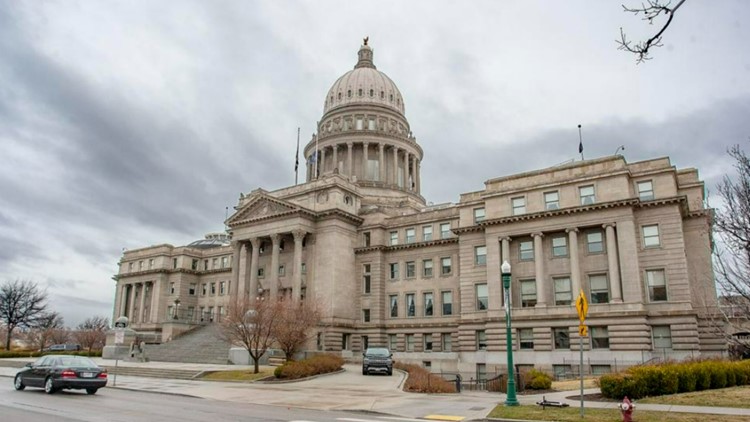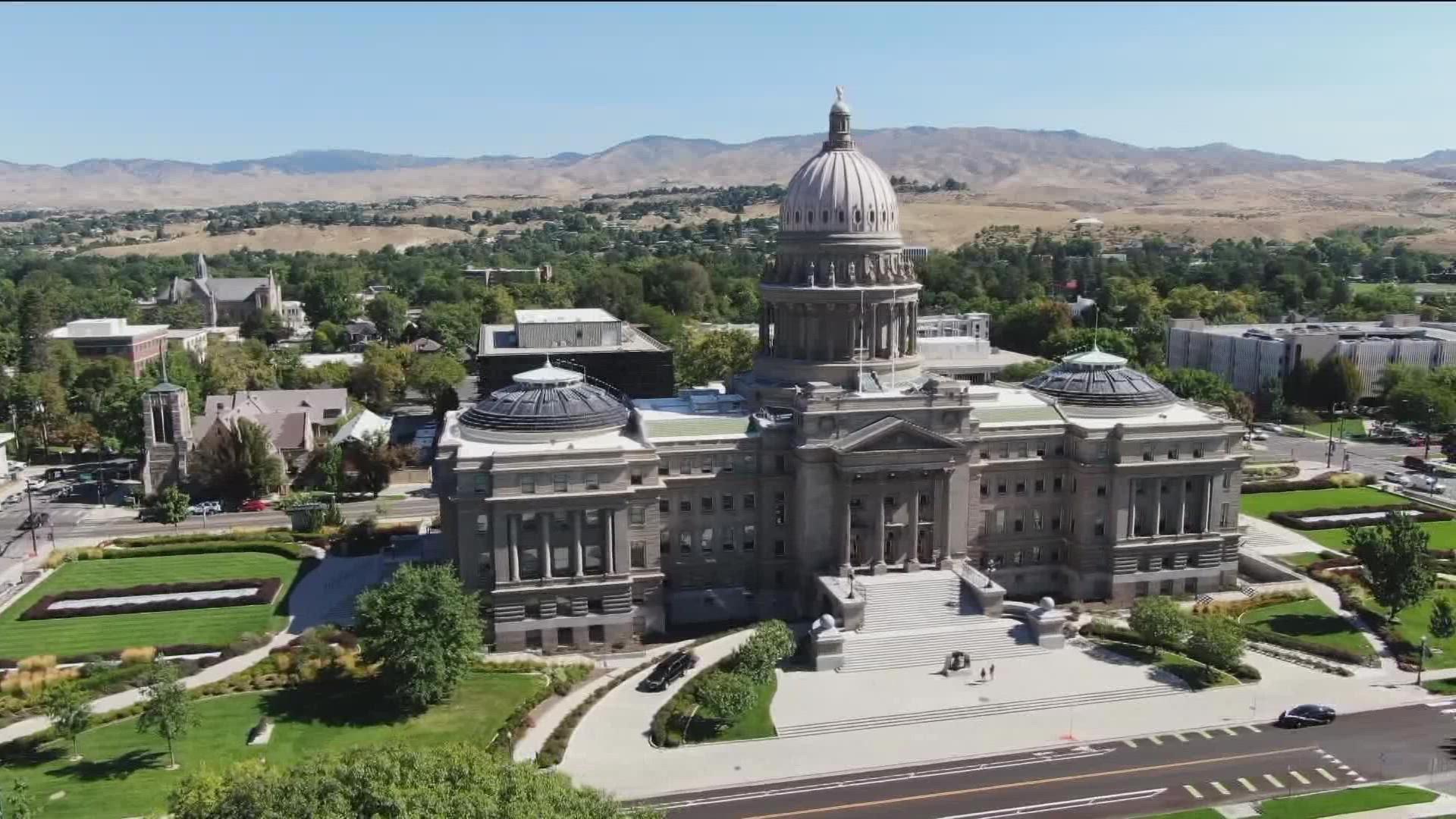BOISE, Idaho — This article originally appeared in the Idaho Press.
Idaho Republicans and Democrats highlighted the progress made on school facility funds, but they had conflicting views on how it was done.
House Republican leaders and Democratic leadership held press conferences Wednesday following adjournment of the 2024 legislative session, discussing the school facilities bill, new budget processes, school choice, legislation tackling controversial social issues, and the lack of new exemptions on Idaho’s abortion laws.
“Probably the bill of the year for me was House Bill 521,” House Speaker Mike Moyle, R-Star, said. “Income tax relief, property tax relief, historic expenditures for facilities for our schools across the state, and will provide even more property tax relief because a lot of our school districts will have the funds they need to build buildings and fix issues so they won’t have to go to the taxpayer.”
House Majority Leader Jason Monks echoed the praise of the school facilities bill HB 521, saying that it built on the work the Legislature has been doing for the last few years.
Democrats were less enthusiastic about the way that HB 521 provided school facilities funding, especially because the multifaceted bill touched so many areas of code and made so many changes in the one 30-page bill. Many Democrats argued they thought it violated the state’s constitutional requirement that legislation only address a single subject.
Senate Minority Leader Melissa Wintrow, D-Boise, said that Democrats helped create a “blueprint” for the facilities bill.
“But unfortunately our GOP colleagues added many more harmful components that plan that really rendered it probably unconstitutional.”
Senate Minority Caucus Chair Janie Ward-Engelking served on the school facilities working group that met over the interim.
“We had a clean facilities bill ready to go,” Ward-Engelking said. “It got hijacked.”
Moyle dismissed some of the complaints over the single-subject rule, saying it did a “lot more good than negative.”
“Sometimes when there’s big bills like that, there’s always one little thing to complain about,” Moyle said. “... You saw that in the Senate, where a lot of them complained and then voted yes.”
NEW BUDGET PROCESS
This legislative session came with a new process for creating budgets, which had a mixed response in the Legislature.
The process involved passing 10 bare-bones “maintenance” budgets in consolidated categories, combining several agency budgets under a larger umbrella. Then later, agencies got separate “enhancement” budgets that included requests for new spending.
Moyle said that although there was a “hiccup” in the new process — which occurred early in the session when several members of the Joint Finance and Appropriations Committee disrupted the new process by passing whole-agency budgets that competed with the maintenance budgets — he felt it was ultimately beneficial.
“I think that where we ended up is positive for the state of Idaho,” Moyle said.
Ward-Engelking and Rep. Brooke Green, D-Boise, both serve on JFAC and said they found value in the new budget working groups, but still had issues with the maintenance and enhancement budgets.
House Minority Leader Ilana Rubel, D-Boise, said some of the processes in JFAC this year seemed to be consolidating power in the budget-writing committee. She pointed to the contentious Idaho Transportation Department budget, which included intent language to kill a planned sale of the agency’s headquarters.
She said she’d seen an “emergence of the imperial JFAC, where major policy issues are now getting slid into footnotes in the budget.”
“What happened with the transportation budget was frankly shocking,” Rubel said.
She argued that the change should have been done in a bill passed through the germane Transportation Committee. These committee hearings allow public testimony, which is not required in JFAC.
SCHOOL CHOICE
School choice, or the ability for public funds to go toward private school tuition and homeschooling, had been targeted as a main issue for several legislators, but nothing made it across the finish line.
A bill that would have created a tax credit that could be used for private school tuition died in committee, Idaho EdNews reported.
Moyle said a new proposal will come up next year.
“I still think that the school choice issue is not going away,” he said. “... I assure you something will happen next year.”
Several attempts last year also died in committee, but Moyle said that each attempt was getting “closer to getting it done.”
Supporters of the legislation say that residents who are paying into the public school system through taxes but not benefiting from it should also get money for their child’s private school education.
Opponents argue that because the state is constitutionally obligated to support a free and common school system, its funds should be focused on the public schools. They also argue the funds would go toward institutions without accountability for how they’re being spent, the curriculum or the outcomes.
“We owe it to the public to be very accountable to their money that we allocate,” Ward-Engelking said. “And public schools are still under the gun, still not adequately funded. ... We do not have the luxury of opening it up to private and religious schools.”
House Minority Caucus Chair Ned Burns had concerns about the process by which the proposals keep coming up, seemingly looking for a committee that may be more likely to pass it. He noted that the House Education Committee in 2023 rejected a number of proposals, and that this year the bill came to the House Revenue and Taxation Committee.
“This is going to keep bubbling up,” Burns said.
SOCIAL ISSUES
This year came with more legislation that targeted transgender issues; this included bills passed to define male and female, prohibit state funds or facilities for being used for transgender health care, and a bill prohibiting policies that require public employees to use preferred pronouns.
Opponents of these bills argued they were discriminatory and would open up the state to costly litigation, as has happened with similarly targeted bills in the past.
“You’re always going to have to go through the court, that’s part of the process,” Moyle said. “But I also think it’s what the citizens of Idaho want.”
Moyle argued that the bills were necessary because “everybody should be treated equally. And sometimes what we find is we want to treat one group more equal than another group, and that’s where you lose me.”
The Democrats opposed all of this legislation, and said it ties to a rise in bills targeting LGBTQ people across the country.
Rubel said these types of bills can make it harder for businesses to recruit.
“GOP lawmakers have relentlessly persecuted our most vulnerable citizens and have left the court for their only hope for relief,” Rubel said. “And I’m sure we will see many of this session’s laws in court.”
The bill that prohibits state funds, including employee health insurance, and public hospitals from being used for gender-affirming care also adds a criminal punishment to doctors who are found to violate it.
Wintrow said it added to a “constant attack” on the medical profession in the state when combined with the felony punishments for abortion and the law prohibiting gender-affirming care for minors.
“People don’t find it safe and welcoming to practice in Idaho,” Wintrow said. “And that’s a problem.”
ABORTION EXEMPTIONS
The Democrats and physicians have repeatedly called for more exemptions to the state’s strict abortion bans. They underscored that many of the state’s OB-GYNs have left.
Idaho has lost 55% of its high-risk obstetricians, the Idaho Capital Sun reported.
Moyle argued that the abortion laws may not be the reason for many of them leaving, saying it’s a “convenient excuse.”
He said the state is waiting on a ruling in the U.S. Supreme Court case against Idaho’s lack of exemptions for the health of the mother in its abortion bans. A ruling will give lawmakers a “better idea” of if anything needs to be done.
When it comes to the definitions for protecting the mother, Moyle said, “I don’t know how you crack that nut yet, because both sides are still so far part.”
Rubel argued that these doctors would rather stay in the state.
“They are not looking for an excuse to leave, they wish they had a reason to stay,” Rubel said.
She said the kind of exodus seen in Idaho has never happened before.
Rubel and Wintrow argued that it may take decades for Idaho to dig its way out of the physician shortage it has created.
The Democrats said there were proposals ready to go, but none of them could get a hearing.
This article originally appeared in the Idaho Press, read more on IdahoPress.com.
Watch more Local News:
See the latest news from around the Treasure Valley and the Gem State in our YouTube playlist:
HERE ARE MORE WAYS TO GET NEWS FROM KTVB:
Download the KTVB News Mobile App
Apple iOS: Click here to download
Google Play: Click here to download
Watch news reports for FREE on YouTube: KTVB YouTube channel
Stream Live for FREE on ROKU: Add the channel from the ROKU store or by searching 'KTVB'.
Stream Live for FREE on FIRE TV: Search ‘KTVB’ and click ‘Get’ to download.



